written by Zach Wright
Throughout the current cycle, demand for single tenant net lease (“STNL”) retail properties has been extremely high. Coupled with limited inventory of available property, this insatiable demand led many STNL properties to sell for high prices and extraordinarily low cap rates. For example, we sold a Freddy’s Frozen Custard and Steakburgers property in Parker, CO for a record-low 4.25% cap rate in August 2022. The property was subject to a 15-year lease guaranteed by a 16-unit franchisee.
Private investors in 1031 exchanges typically account for a significant portion of the STNL demand and transaction volume. Motivated by deferring significant long-term capital gains taxes, these investors are subject to strict and short timelines. They commonly are switching asset classes; selling management intensive properties (such as multifamily or shopping centers) or properties with limited-to-no income (such as farmland or developable land) to acquire STNL properties. With passive leases containing zero landlord responsibilities that are occupied by high-credit tenants on long-term leases, STNL properties are coveted by many 1031 exchange investors for retirement or estate planning due to their stability and ease of ownership. Some of the most popular STNL retail tenants include Dollar General, 7-Eleven, O’Reilly Auto Parts, Walgreens, and Starbucks. Private 1031 exchange investors are typically the most aggressive purchasers often acquiring properties for the lowest cap rates.
The demand for STNL properties is a byproduct of other asset classes transacting with high velocity and volumes, as well as strong pricing. As the Federal Reserve began to raise the federal-funds rate in March 2022, other asset classes became almost instantly impacted. With interest rates rising for much of 2022, transaction volume in these other asset classes began to quickly fall. For example, multifamily transaction volume in 2022 was down 32% and 18% in Colorado and the U.S. (respectively) compared to 2021 according to CoStar. Most notably, Q4 2022 multifamily transaction volume was down 65% and 50% in Colorado and the U.S. (respectively) compared to the same period in 2021.
The substantial drop in transaction volume of other asset classes has directly impacted demand amongst one of STNL’s most aggressive buyers – the private 1031 exchange investor. Due to the life cycle of a sales transaction and the 45-day identification period with a 1031 exchange, there was a lag until the reduced demand caught up to the STNL market. It was not until late October 2022 that letter of intents, property inquiries, and phone calls began to slow down from 1031 exchange investors.
STNL properties have also been directly impacted by the recent sharp rise in interest rates. The spread between cap rates and cost-of-capital is as thin as it’s ever been. This has directly impacted the financeability of many STNL properties as loan-to-values have been significantly reduced in order for properties to cash flow. Furthermore, yields have risen across the board providing investors attractive alternative safe investments to place capital such as treasuries, bonds, money market accounts (MMAs), or certificate of deposits (CDs).
With widespread economic uncertainty, many STNL buyers are taking a “wait and see” approach. STNL buyers and sellers continue to carefully monitor interest rates and the Federal Reserve’s ability to rein in inflation while hopefully not causing a recession. This has led to excess capital sidelined while the short-term and long-term economic picture becomes clearer.
Institutional investors, such as publicly traded and privately held REITs, compose a large portion of the STNL sector’s demand and many have remained active. However, almost all have increased their yield thresholds due to their higher cost of capital. Few sellers have lowered their pricing expectations to the levels many institutions can afford to pay.
The STNL sector is 4+ months into a period of price discovery as buyers and sellers search for a pricing equilibrium. With the current pullback in demand, STNL cap rates have moved upwards. There are deal anecdotes where a particular property is selling today for a cap rate 50-125 BPS higher than an identical deal (same tenant, lease term, MSA, etc.) sold a year earlier.
With a limited buyer pool of active buyers, inventory of available properties is beginning to build up. This has led to widening of bid-ask spreads. According to a recent 2022 Q4 report by The Boulder Group, the bid-ask spread for STNL retail properties nationally is 28 basis points. The anticipation is for this spread to further widen as the year progresses.
While there are outlier properties and deals, the marketing period to effectively find buyers has been extended. With fewer active buyers in the marketplace, the search to find the “right” buyer has been prolonged. As recently as early 2022, it was not uncommon for multiple offers to be generated in the first few days of publicly marketing and buyers to be selected during this time.
Despite a temporary pullback in demand, the long-term outlook for STNL properties remains very positive. Their long-term leases to high-credit tenants provide landlords stability through economic downturns. As a generation of highly successful real estate investors continues to enter the later years of their lives and retirement, they’ll continue to seek STNL properties due to their passive leases, strong credit, reliable income, and ability to defer significant tax liability via a 1031 exchange. As transaction volumes in other asset classes normalize, demand for STNL properties will quickly pick back up.
Be the first to know about new investment properties.
Subscribe to our mailing list



